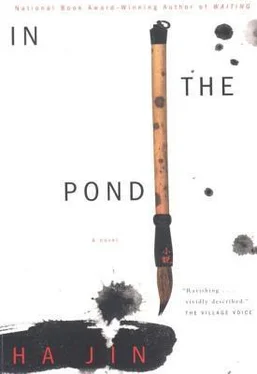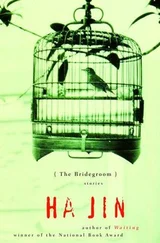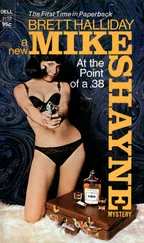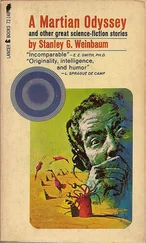Ha Jin - In the Pond
Здесь есть возможность читать онлайн «Ha Jin - In the Pond» весь текст электронной книги совершенно бесплатно (целиком полную версию без сокращений). В некоторых случаях можно слушать аудио, скачать через торрент в формате fb2 и присутствует краткое содержание. Год выпуска: 2014, ISBN: 2014, Издательство: Knopf Doubleday Publishing Group, Жанр: Современная проза, на английском языке. Описание произведения, (предисловие) а так же отзывы посетителей доступны на портале библиотеки ЛибКат.
- Название:In the Pond
- Автор:
- Издательство:Knopf Doubleday Publishing Group
- Жанр:
- Год:2014
- ISBN:978-0-8041-5372-0
- Рейтинг книги:4 / 5. Голосов: 1
-
Избранное:Добавить в избранное
- Отзывы:
-
Ваша оценка:
- 80
- 1
- 2
- 3
- 4
- 5
In the Pond: краткое содержание, описание и аннотация
Предлагаем к чтению аннотацию, описание, краткое содержание или предисловие (зависит от того, что написал сам автор книги «In the Pond»). Если вы не нашли необходимую информацию о книге — напишите в комментариях, мы постараемся отыскать её.
Under the Red Flag, Ocean of Winds
Waiting
In the Pond — читать онлайн бесплатно полную книгу (весь текст) целиком
Ниже представлен текст книги, разбитый по страницам. Система сохранения места последней прочитанной страницы, позволяет с удобством читать онлайн бесплатно книгу «In the Pond», без необходимости каждый раз заново искать на чём Вы остановились. Поставьте закладку, и сможете в любой момент перейти на страницу, на которой закончили чтение.
Интервал:
Закладка:
Mr. Chai shook his head and chortled. “I’m damned again. You said you carved this last night?” he asked Bin.
“Yes. I had no time to paint or write calligraphy, so I carved this seal for you. I’m also a painter, you know.”
“This is excellent work, young man!” Mr. Chai handed the seal to his wife and said, “Look at it, a real piece of art.” Then he got to his feet and went to another room.
“See, you made him happy, Young Shao,” Peina said, gazing at her husband’s back while fingering the seal.
In no time Mr. Chai returned with a blank sheet of paper and a case of scarlet ink paste. He placed the sheet on a book and pressed the stone into the ink box. After blowing on the face of the seal, he stamped it on the paper. The square characters — YOUR BRUSH WRITES, RAISING WIND AND RAIN — appeared in a robust form. Mr. Chai bit his lower lip and said, “It’s awesome, simply awesome. The lines are so ancient, so natural and sturdy. I’ll stamp this on all my books.”
Bin couldn’t stop smiling and knew the Chais would surely help him.
Soon they were talking about the case over dinner, which was noodles with gravy made of minced pork and string beans. In addition, there were two side dishes: eggs stir-fried with leeks and a cucumber salad, seasoned with vinegar, mashed garlic, sesame butter, and a few tiny dried shrimp. Peina had received a long letter from her nephew a week before, so the Chais knew the whole story. She said it would be better if Bin himself took the written complaint to the editorial department the next morning. Bin was taken aback by the suggestion, suspecting she might not want to be too involved. She smiled and explained that her intention was to make the journal respond to the case in the coming issue, whose space had already been planned out. The only way to accomplish that goal was through touching the hearts of the editors, arousing their anger and sympathy, and convincing them of the necessity of reporting the case without delay. Mr. Chai told Bin to try to be emotional when he handed the letter of complaint to the editor in chief. It would be better if Bin could shed a few tears, because the sincerity of one’s words could be gauged only by witnessing his emotion; words alone were merely clever creatures, which tended to arouse suspicion. But Bin must never appear glib in front of the editors. Mr. Chai didn’t worry about that, since Bin looked pretty honest, even a little gauche.
As to Bin’s lodging for the night, Mr. Chai suggested that he stay at a small inn outside the compound, because some of the editors, living in the same building as the Chais, would infer that Peina was involved in the case if they saw Bin enter or come out of her apartment. Then they wouldn’t believe what Bin said at the editorial department the next day.
Bin thought Mr. Chai’s suggestion was reasonable. So after tea, when the twilight turned indigo, Mr. Chai took Bin to the inn through the back door of the compound. Walking along the sidewalk of a boulevard, under the fat sycamore leaves, he explained to Bin that he would have kept him company for another few hours, but two editors of Law and Democracy were coming to his home that night for a mah-jongg party at which they were going to discuss some publishing matters.
To make up for the early parting, Mr. Chai paid three yuan for Bin’s lodging after telling the front-desk clerk that Bin was a friend of his and that they should give him a decent bed, which they managed to do.
At eight the next morning Bin arrived at the gray building that Law and Democracy shared with a bookstore. He climbed the creaking stairs to the top floor to see the editor in chief. To his surprise, the editorial department had only one large office. In the room four ceiling fans were languidly flapping their brass wings; about a dozen desks stood here and there; two khaki screens separated a few desks from the rest. A young woman with long hair over her sloping shoulders led Bin to the only mahogany desk, at which a dyspeptic-faced man, around forty, was sitting and writing on a pad of paper. Behind him, on the wall, spread a colorful map of China like a giant rooster.
“Here’s Editor in Chief Wang,” the woman said to Bin and turned away, back to the reception desk. Bin noticed that Peina was reading at a desk twenty feet away. She kept her head low but threw glances in his direction now and then.
“I’m Wang Min,” the editor said, holding out his hand indifferently.
Bin gave his fleshy hand a shake. The second he sat down, he cleared his throat and began to speak. “My name is Shao Bin. I’m a worker and artist, from Gold County, Liaoning Province. I’m thirty-two, born in the Dog Year. I came to the capital to present a petition to you and hope you will help me and my comrades. I believe this is the place to look for justice.” He paused, pulled a large envelope from his satchel, and presented it with both hands to the editor in chief.
Wang took the letter of complaint out of the envelope without removing his bleary eyes from Bin’s face. He was a little puzzled by Bin’s expression, which was between smiling and weeping. Tears were flickering in Bin’s eyes and a few running down his cheeks. Wang couldn’t tell whether Bin was too excited or too upset; he wondered why tears were shed so easily. He lowered his head and glanced through the first two pages of the complaint, then put it on the desk and asked Bin to talk about his case.
Bin went on, “I began to work as a fitter in Dismount Fort’s Harvest Fertilizer Plant in 1971. I have worked well and studied conscientiously. Although I have only eight years’ formal education, I taught myself painting, calligraphy, epigraphy, and poetry. The fine arts are my only hobby — no, my life. Up to now I have published about a hundred pieces of artwork in newspapers and magazines. To put it immodestly, I was the best-known man in our town. Because of my ability and name, some people in the plant are jealous of me.”
He took a gray handkerchief out of his trouser pocket, blew his nose, and mopped his face. He let out a sob, then went on, “Last winter I published a cartoon in the Lüda Daily criticizing the unhealthy tendency in society, particularly about housing assignments. After the plant’s leaders saw it in the newspaper, the Party secretary, Liu Shu, and the director, Ma Gong, began persecuting me. They called me a ‘lunatic’ at a general staff meeting and had my half year’s bonus deducted. They said I had slung mud on the plant’s face. From then on, they’ve seized every opportunity to oppress me. They beat me in their office and kicked my private parts at a conference. My entire family has suffered from their abuse of power.”
He had to stop to catch his breath, since his sobbing had grown uncontrollable. A few of the editorial staff came over to listen to his story. Among them, of course, was Peina.
Bin continued to talk while tears streamed down his cheeks. Never had he been so heartbroken and so full of misery, as though a tap in him were broken and nothing could stop the fountains flowing down his face.
While he was talking about the leaders’ evil deeds, all the misfortunes that had happened to him in the past arose in his mind: the hunger in the early 1960s, when he often cried for a genuine corn cake because everybody in the family had to eat wild herbs and elm bark; the death of his mother, drowned in a flood; his right leg broken in a sandpit in elementary school (for that, he was rejected by the drafting center and couldn’t fulfill the ideal of his youth — to become a colonel or a general, a man well versed in both arms and letters); his having to repeat the fourth grade because he had flunked math; the two hundred yuan, half of the Shaos’ savings, stolen from his pocket when he visited Shenyang City to see an art exhibition; his elder brother blown to pieces by a land mine in a militia drill; the death of his firstborn, a boy — a loss that had cut his family line …
Читать дальшеИнтервал:
Закладка:
Похожие книги на «In the Pond»
Представляем Вашему вниманию похожие книги на «In the Pond» списком для выбора. Мы отобрали схожую по названию и смыслу литературу в надежде предоставить читателям больше вариантов отыскать новые, интересные, ещё непрочитанные произведения.
Обсуждение, отзывы о книге «In the Pond» и просто собственные мнения читателей. Оставьте ваши комментарии, напишите, что Вы думаете о произведении, его смысле или главных героях. Укажите что конкретно понравилось, а что нет, и почему Вы так считаете.






![О Генри - Пимиентские блинчики [The Pimienta Pancakes]](/books/407355/o-genri-pimientskie-blinchiki-the-pimienta-pancake-thumb.webp)





